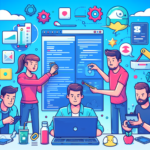Imagine you’re building a sandcastle. You don’t start with the whole castle at once. Instead, you build it bit by bit, making adjustments as you go along. That’s kind of like Agile methodology in software development. It’s a way of working that’s flexible and adaptable, so you can keep improving your software until it’s just right.
Traditional software development is more like building a dam. It’s slow and methodical, and there’s no room for changes once you’ve started. With Agile, you can change things on the fly, so you’re always making the best software you can.
Understanding the Agile Approach
Agile is not just a methodology; it’s a mindset:
- Iterative Development:
Instead of a linear approach, Agile breaks the development process into smaller iterations or ‘sprints.’ SAYGE utilizes modern project management tools like Jira and Asana to streamline sprint planning, backlog management, and sprint retrospectives, ensuring smooth iterative development. - Collaboration:
Cross-functional teams work collaboratively, ensuring diverse perspectives and expertise are harnessed. SAYGE takes collaboration to the next level with tools like Slack and Microsoft Teams, fostering real-time communication and virtual collaboration among team members, no matter where they are located. - Feedback Loops:
Regular reviews and feedback ensure the product aligns with user needs and expectations. SAYGE embraces continuous feedback through user testing platforms like UserTesting and UsabilityHub, allowing for rapid adjustments based on user insights.
Key Principles of Agile
The Agile Manifesto outlines several core principles, and SAYGE aligns with them using up-to-date solutions:
- Customer Satisfaction:
Delivering valuable software promptly and consistently. SAYGE employs continuous integration and continuous deployment (CI/CD) pipelines with tools like Jenkins and Travis CI, ensuring that code changes are automatically built, tested, and deployed, leading to rapid and reliable deliveries that satisfy customers. - Embrace Change:
Welcoming changing requirements, even late in development, to provide the customer with a competitive advantage. SAYGE implements Agile project management tools like Trello and Monday.com, allowing for dynamic task management and easy adaptation to evolving project requirements. - Frequent Deliverables:
Releasing working software frequently, ranging from a couple of weeks to a couple of months. SAYGE utilizes containerization with tools like Docker and Kubernetes, enabling the packaging and deployment of software in isolated environments, facilitating the release of frequent updates without disrupting existing functionality. - Stakeholder Collaboration:
Engaging business stakeholders and developers throughout the project. SAYGE embraces real-time collaboration platforms such as Figma for design collaboration and Miro for collaborative brainstorming sessions, ensuring active involvement of stakeholders in the development process.
Benefits of Adopting Agile
The Agile approach offers numerous advantages, and SAYGE enhances these benefits with modern solutions:
- Flexibility:
Agile teams can quickly pivot based on feedback or changing market dynamics. SAYGE incorporates agile project management methodologies like Scrum and Kanban to provide teams with the flexibility to adapt to evolving project requirements seamlessly. - Faster Time-to-Market:
With regular iterations, products or features can be launched faster. SAYGE leverages cloud platforms like Amazon Web Services (AWS) and Google Cloud Platform (GCP) to accelerate development and deployment, reducing time-to-market significantly. - Enhanced Quality:
Regular testing and reviews ensure the software is of high quality and meets user requirements. SAYGE implements automated testing frameworks like Selenium and Cypress to ensure thorough testing of applications, enhancing software quality and reliability.
Challenges in Agile Implementation
While Agile offers many benefits, it’s not without challenges, and SAYGE addresses these with up-to-date solutions:
- Cultural Shift:
Transitioning from traditional models to Agile requires a change in mindset and can face resistance. SAYGE fosters an Agile culture through virtual training and workshops using platforms like Zoom and Microsoft Teams, making Agile adoption a smooth transition for teams. - Effective Communication:
With frequent collaborations, clear communication becomes crucial to avoid misunderstandings. SAYGE relies on virtual communication tools like Slack and Zoom to facilitate seamless communication and collaboration among distributed teams. - Resource Management:
Agile projects require dedicated teams and consistent focus, which can strain resources. SAYGE utilizes resource management software such as ResourceGuru and Float, ensuring efficient allocation and tracking of resources across projects.
SAYGE’s Commitment to Agile
At SAYGE, Agile is more than a methodology; it’s a way of life:
- Trained Professionals:
Our teams are well-versed in Agile practices, ensuring efficient and effective project management. We invest in up-to-date Agile certifications and training programs to keep our teams at the forefront of Agile best practices. - Custom Agile Solutions:
We tailor the Agile approach based on project needs, ensuring optimal results. With our deep knowledge of modern Agile tools and methodologies, we create bespoke solutions that fit each project’s requirements. - Continuous Learning:
We invest in Agile training and resources, ensuring our teams are always at the forefront of Agile best practices. We stay updated with the latest Agile trends and tools to provide our clients with cutting-edge solutions.
The Agile methodology, with its emphasis on flexibility, collaboration, and user feedback, is redefining the software development landscape. As the digital world evolves at breakneck speed, Agile offers businesses the tools to stay ahead, innovate, and deliver exceptional value. With SAYGE’S deep expertise in Agile practices and the use of up-to-date solutions, businesses can confidently navigate the complexities of software development, ensuring timely, high-quality, and user-centric solutions.





